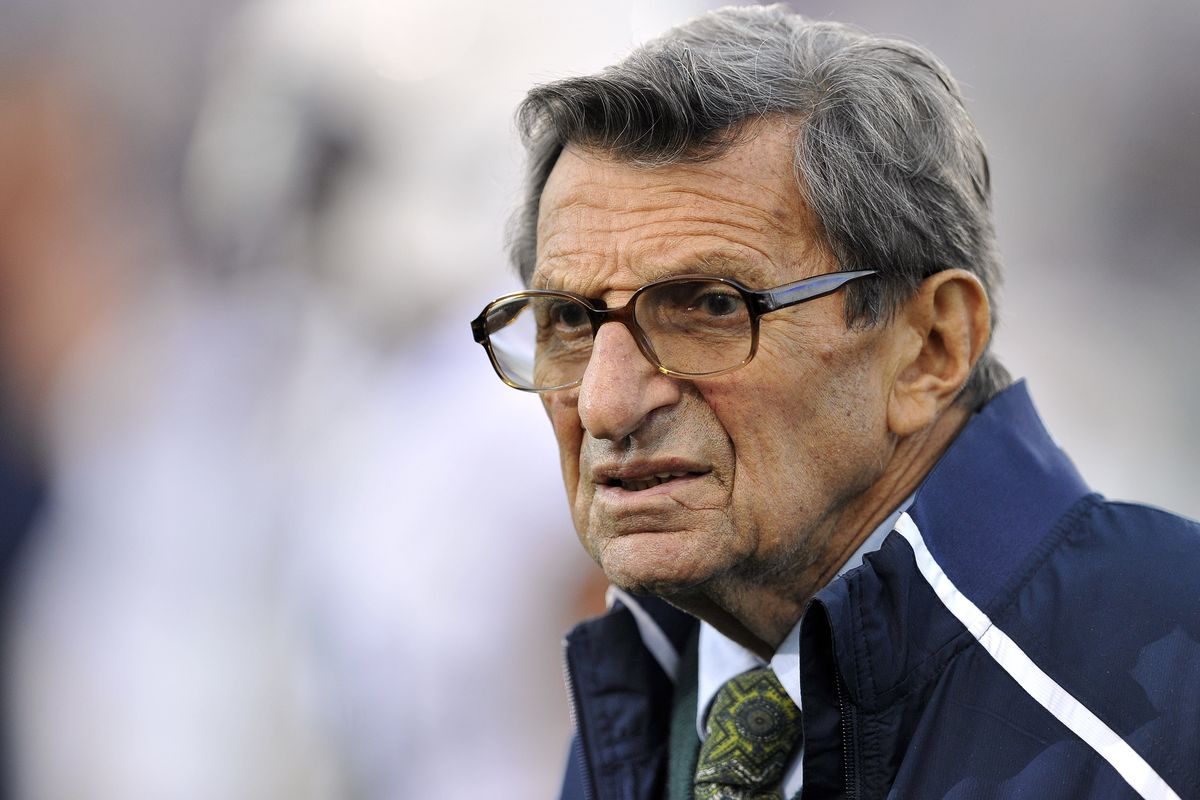Paterno took new approach to football

Joe Paterno, the coach who transformed sleepy Penn State University into a national football power with an academics-based philosophy only to see his career end abruptly and his legacy tarnished by a child sex abuse scandal, has died. He was 85.
Paterno died Sunday morning in State College, Pa., his family announced.
He was diagnosed with lung cancer in November, only days after Penn State’s board of trustees fired the legendary coach in the wake of the arrest of his former defensive coordinator, Jerry Sandusky, on multiple felony counts of sexual abuse of boys.
Paterno was not implicated in a grand jury’s indictment of Sandusky but was criticized for not acting more aggressively in 2002 after a graduate assistant informed Paterno he saw Sandusky sexually molest a boy in a locker room shower at Penn State. Paterno had fulfilled his legal obligation by passing the information on to his superior, athletic director Tim Curley.
Paterno’s inglorious exit shocked a community that watched him rise from a young assistant to become a national icon. His Coke-bottle eyeglasses and rolled-up pant legs came to embody the school’s victories-with-virtue persona.
The coach was so beloved in State College that full-size cardboard cutouts of him were common sights around town. Even an ice cream flavor, “Peachy Paterno,” was named after him.
But on Nov. 10, 2011, five days after the scandal broke, the Penn State trustees fired Paterno three games short of completing his 46th season as head coach.
The board of trustees denied Paterno’s request to retire at the end of the 2011 season. Only days after he issued a tempered response to the initial Sandusky allegations, Paterno expressed heartfelt remorse over what had happened on his watch.
“I am absolutely devastated by the developments in this case,” Paterno said in a statement released hours before he was fired. “I grieve for the children and their families, and I pray for their comfort and relief.”
He vowed to “spend the rest of my life doing everything I can to help this university.”
For more than six decades, Paterno had coached at Penn State after joining Rip Engle’s staff in 1950 as a 23-year-old assistant. His career ended late last year less than two weeks after he recorded his 409th career victory, which moved him past former Grambling Coach Eddie Robinson on major college football’s all-time list.
Paterno spent his entire career at Penn State, taking over as head coach in 1966. He was a five-time national coach of the year, won two national titles, fielded five unbeaten teams and was the first major college coach to eclipse Bear Bryant’s victory record of 323.
Paterno ended his career as the all-time leader in bowl appearances (37) and bowl victories (24) and in 2006 was inducted into the College Football Hall of Fame. He is the only coach to have won all four of college football’s major bowls: Rose, Fiesta, Orange and Sugar.
Voted into the same Hall of Fame class, Paterno and Florida State Coach Bobby Bowden spent years jostling for the all-time major college win record.
“Joe has done everything right,” Bowden said in a 1998 interview. “He graduates his players, he’s articulate and his character is impeccable, in my opinion.”
During Paterno’s tenure, Penn State produced 79 first-team All-America players, 33 first-round NFL draft picks and 16 National Football Foundation scholar-athletes.
The list of those who played for Paterno includes Jack Ham, John Cappelletti, Franco Harris, Lydell Mitchell, Curt Warner, Shane Conlin, Matt Millen, Todd Blackledge, Kyle Brady, LaVar Arrington, Larry Johnson, Courtney Brown and Kerry Collins.
Paterno’s teams were known for their toughness and selflessness. The school’s blue-and-white uniforms were famously nondescript – lacking player names, decorations or logos – a Brand X quality that came to symbolize the program’s team-first image.
His quest for a national title was finally realized in the 1982 season when a Penn State win over Georgia in the Sugar Bowl pushed the Nittany Lions to No. 1. Paterno claimed his second national title four years later after a hyped win over Miami in the Fiesta Bowl.
In 1993, after more than 100 years as an independent, Penn State became the 11th member of the Big Ten Conference.
In 1994, Penn State capped a 12-0 season with a Rose Bowl win over Oregon, but the Nittany Lions ended up No. 2 behind Nebraska in both the Associated Press and USA Today/CNN polls.
Competing in the Big Ten would become increasingly difficult.
Penn State endured four losing seasons in a five-year span beginning in 2000, prompting calls by some for Paterno to retire. There were websites devoted to his departure, but Paterno vowed to coach as long as his health allowed.
Paterno exacted revenge on detractors when his 2005 team finished 11-1 and defeated Florida State in the Orange Bowl.
His survivors include his wife, whom he married in 1962, and children Diana, Mary, David, Jay and Scott – all Penn State graduates – and 17 grandchildren.